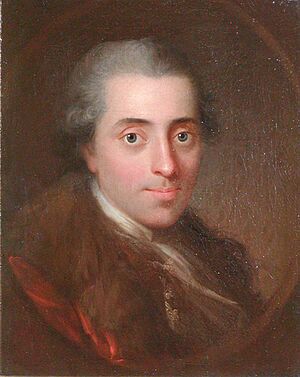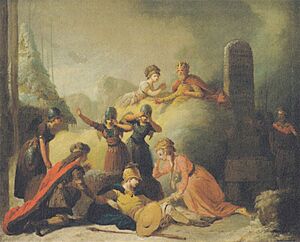Johannes Ewald facts for kids
Johannes Ewald (born November 18, 1743 – died March 17, 1781) was a famous Danish writer. He wrote plays, poems, and hymns. You might know one of his songs, "Kong Christian stod ved højen mast", which is one of Denmark's national anthems! It shares this special title with another song, "Der er et yndigt land". For a long time, Ewald was seen as the best Danish poet. Today, people respect his work a lot, even if they don't read all of it often.
His Life Story
Johannes Ewald was born in Copenhagen, Denmark. His father was a vicar, a type of church leader. Johannes lost his father when he was quite young.
When he was 15, he and his brother ran away from home. They joined the Prussian army. But Ewald didn't like it there. He soon left the Prussian army and joined the Austrian army instead. After a few months, he left that army too and came back home. He was quite weak after his time in the wars.
He then started studying theology at the University of Copenhagen in 1758. He finished his studies in 1762. Even though he studied to be a theologian, he was much more interested in writing. A sad love story inspired many of his later poems.
After the death of King Frederick V of Denmark in 1766, Ewald was asked to write a special poem. Everyone loved it, and this made him want to write even more. He quickly became one of the most important poets and playwriters in Denmark.
From 1769, Ewald suffered from a painful illness called gout. This often kept him in bed. From 1773 to 1775, he felt a bit better while staying at Rungstedlund. Later, his friends helped him move to Søbækshus, near Helsingør. He lived there for some years, and his fame as a writer grew.
Ewald's life was difficult because of his illness and other problems. He died at the age of 37. He was buried in Copenhagen.
His Writings
As a writer, Ewald showed strong feelings in his work, like happiness, sadness, and love. He was an important writer who helped start new ideas in literature that later became known as romanticism. He was inspired by German writers and others like Edward Young and Jean-Jacques Rousseau.
Poems
Several of Ewald's poems are famous Danish classics. He became well-known after writing a beautiful poem for the death of King Frederick V of Denmark in 1766.
His poem "Rungsteds Lyksaligheder" (written in 1773), which means "The Happiness of Rungsted," is a poem praising nature and its Creator. "Ode til Sjælen" ("For the Soul") celebrates how special humans are. He also wrote a hymn called "Udrust Dig, helt fra Golgatha" ("Arm Yourself, Hero of Golgatha") in 1781, which he wrote almost on his deathbed.
Plays
Ewald's plays are also very important. He was one of the first writers to use old Norse myths in his plays. This was a new idea that pointed towards the romantic style of writing.
He wrote the plays Rolf Krage in 1770, Balders Død (which means "The Death of Balder") in 1773, and Fiskerne (The Fishermen) in 1779. From The Fishermen play, one song is still very famous in Denmark: "King Christian stood by the lofty mast". As mentioned, this song is one of Denmark's national anthems. The music for Balders Død and The Fishermen was written by the composer Johann Hartmann.
Other Writings
Ewald also wrote an autobiography, which is a story of his own life. It was called Levnet og Meninger ("Life and Opinions"). He wrote parts of it between 1774 and 1778, but it was published after he died. It tells about his early love story and his adventures in the army.
See also
 In Spanish: Johannes Ewald para niños
In Spanish: Johannes Ewald para niños
- Johannes Ewald and Johan Hermann Wessel Memorial
Note
 This article incorporates text from a publication now in the public domain: "Ewald, Johannes". Encyclopedia Americana. (1920).
This article incorporates text from a publication now in the public domain: "Ewald, Johannes". Encyclopedia Americana. (1920).
 | May Edward Chinn |
 | Rebecca Cole |
 | Alexa Canady |
 | Dorothy Lavinia Brown |



